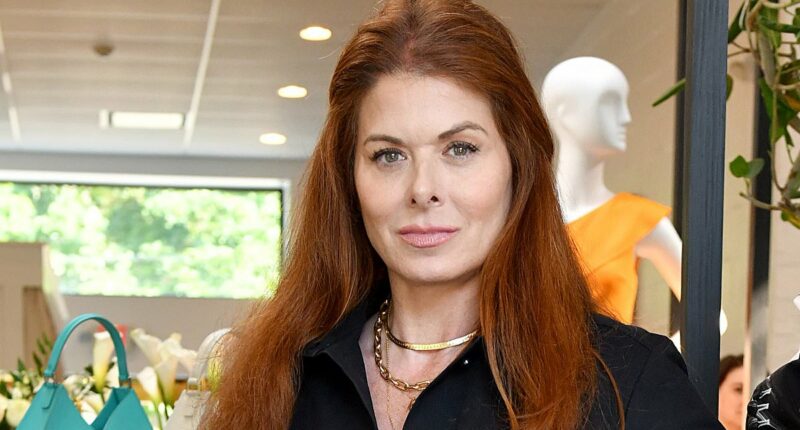Share this @internewscast.com
A growing rift has opened up in Hollywood over the war in Gaza as more than 1,200 entertainment industry figures signed a new open letter rejecting a high-profile pledge by thousands of their peers to boycott Israeli films.
Among the signatories are Liev Schreiber, Debra Messing, Sharon Osbourne, Howie Mandel, Erin Foster and Gene Simmons, who have all lent their names to a letter organized by nonprofit groups Creative Community for Peace and The Brigade.
The statement, released on Thursday, takes direct aim at the boycott call issued earlier this month by the collective Film Workers for Palestine, which drew support from stars including Emma Stone, Joaquin Phoenix, Olivia Colman, and Mark Ruffalo.
‘We know the power of film. We know the power of story. That is why we cannot stay silent when a story is turned into a weapon, when lies are dressed up as justice, and when artists are misled into amplifying antisemitic propaganda,’ the letter begins.
It argues that the boycott pledge is ‘not an act of conscience’ but instead ‘a document of misinformation that advocates for arbitrary censorship and the erasure of art.’
Messing issued her own statement underscoring that view: ‘When artists boycott fellow artists based solely on their country of origin, it is blatant discrimination and a betrayal of our role as storytellers.’

Liev Schreiber (pictured in 2020), Debra Messing and Mayim Bialik have signed a new open letter rejecting a high-profile pledge by thousands of their peers to boycott Israeli films
The letter emphasizes that Israeli film institutions are not government entities but instead ‘often the loudest critics of government policy.’
As an example, it pointed to Israel’s recent Academy Award submission The Sea, a film about a Palestinian boy who risks death to visit a Tel Aviv beach.
Despite its critical acclaim, the project sparked backlash from Israel’s sports and culture minister, who vowed to cut funding for the country’s national film awards.
The statement also highlights the collaborations between Jewish and Palestinian creatives within Israel’s industry, describing it as a ‘vibrant hub’ where artists work together daily to tell complex, often critical stories.
The open letter lands in response to the September 8 pledge by Film Workers for Palestine, which has nearly 5,000 signatures.
That document called on artists to refuse partnerships with Israeli film institutions deemed ‘implicated in genocide and apartheid against the Palestinian people.’
‘In this urgent moment of crisis, where many of our governments are enabling the carnage in Gaza, we must do everything we can to address complicity in that unrelenting horror,’ the boycott letter declared.
But critics argue the move risks silencing dissent rather than amplifying dialogue.

The statement takes direct aim at the boycott call issued recently by the collective Film Workers for Palestine, which drew support from stars like Emma Stone (seen in April 2025) and Joaquin Phoenix

‘When artists boycott fellow artists based solely on their country of origin, it is blatant discrimination and a betrayal of our role as storytellers,’ Messing wrote in her own statement
Earlier this month, Paramount condemned the boycott.
‘Silencing individual creative artists based on their nationality does not promote better understanding or advance the cause of peace. We need more engagement and communication — not less,’ the studio declared.
The counter-letter, signed by Schreiber and Messing, invoked history as a cautionary tale.
It compared the proposed boycott to past abuses of censorship, from Nazi Germany’s propaganda machine to Soviet-era restrictions and even Hollywood’s own blacklist during McCarthyism.
‘Every time it was dressed up as virtue. And every time it was oppression. Every time, its targets expanded,’ the letter warns. ‘We know that many of you have good intentions and believe you are standing for peace. But your names are being weaponised and tied to lies and discrimination. This pledge erases dissenting Israeli voices, legitimises falsehoods, and shields Hamas from blame.’

‘We know the power of film. We know the power of story. That is why we cannot stay silent when a story is turned into a weapon, when lies are dressed up as justice, and when artists are misled into amplifying antisemitic propaganda,’ the letter begins (Sharon Osbourne pictured in February 2025)

Gene Simmons (seen earlier this month) also rejected the pledge to boycott Israeli films

Actress Mayim Bialik stated: ‘Boycotting Israelis fuels division and marginalization. This pledge does nothing to end the war in Gaza, free hostages, or curb antisemitism’
Instead, it calls on the global film community to support artists who foster dialogue across divides, demand the release of hostages still held by Hamas, and ‘let art speak the whole truth.’
Actress Mayim Bialik stated: ‘Artists must remind the world of our shared humanity. Boycotting Israelis fuels division and marginalization. This pledge does nothing to end the war in Gaza, free hostages, or curb antisemitism.’
Rebecca De Mornay pointed out in her own statement: ‘Israel alone is singled out and condemned for defending itself and confronting enemies. Boycotting Israeli films isn’t justice—it’s a double standard for Jews and an unjust punishment of Israeli artists.’
Saban Entertainment CEO, Haim Saban, said: ‘Storytelling builds understanding around our shared humanity. Excluding Israeli filmmakers betrays that mission. True progress comes when Israelis and Palestinians listen to one another, and art opens doors politics often close.’






